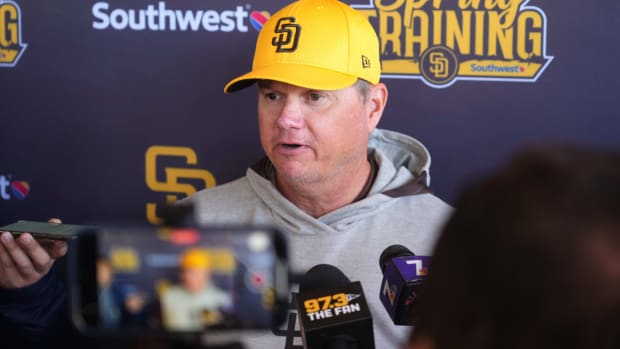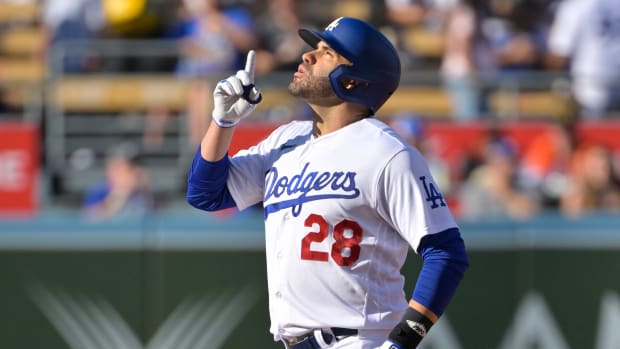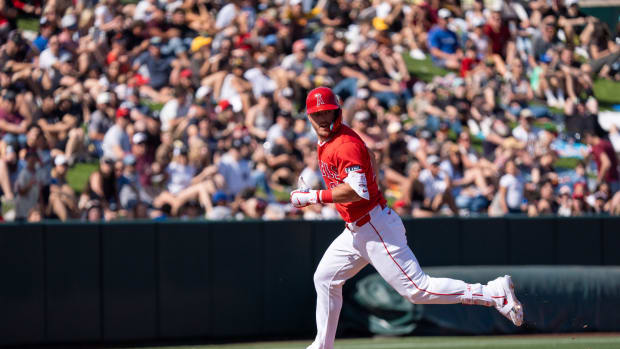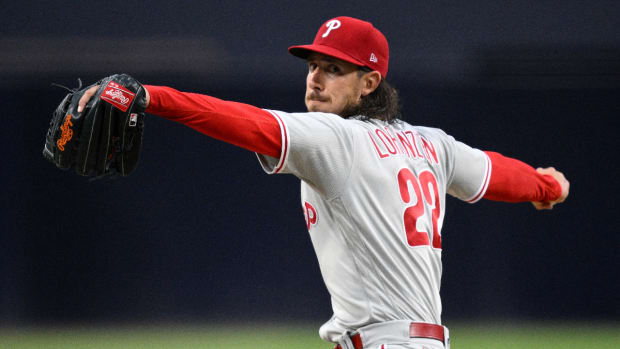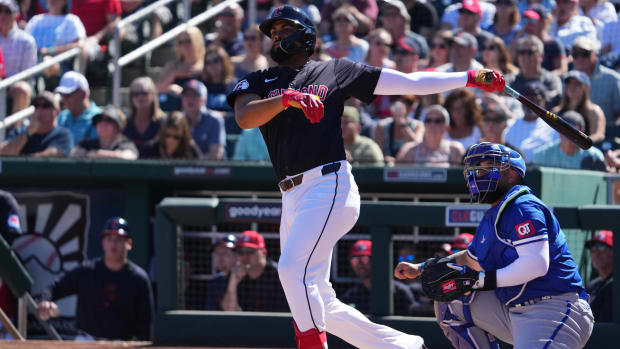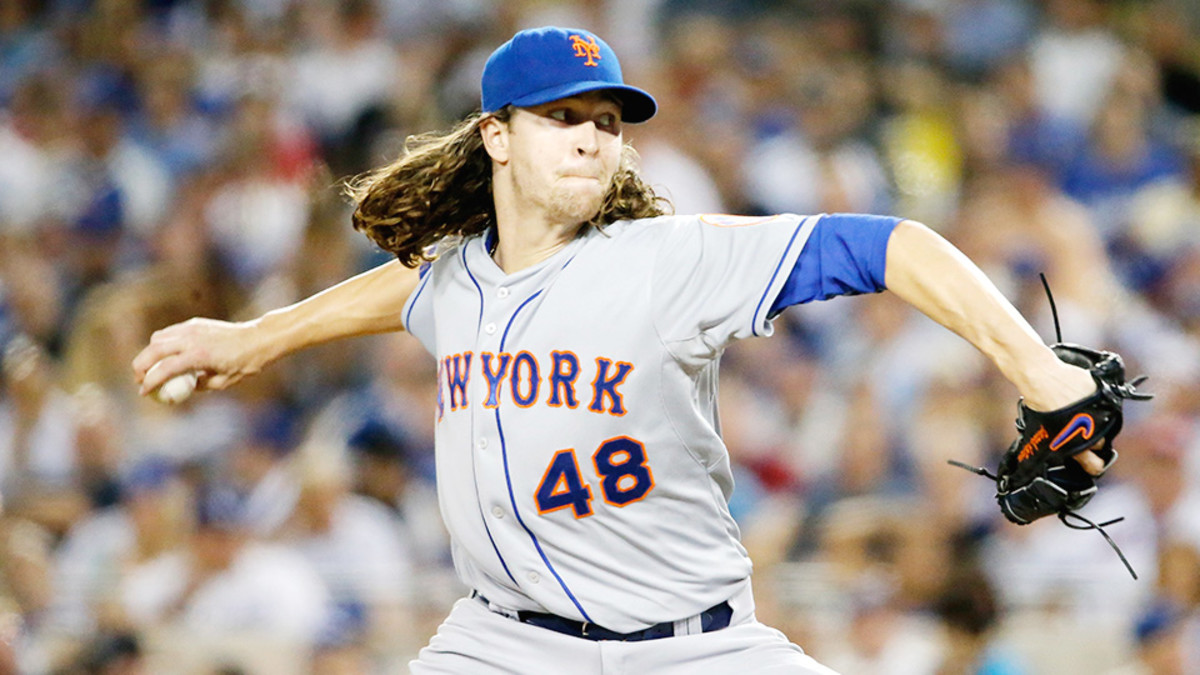
Mets’ deGrom outduels Kershaw in Game 1 to leave Dodgers in tough spot
LOS ANGELES — Three quick thoughts from Dodger Stadium after the Mets beat the Dodgers, 3–1, in Game 1 of the NLDS on Friday night:
1. The Tortoise lost to the Hair
The long-locked Mets starter Jacob deGrom threw his average fastball a little under 96 mph during the regular season, but on a 92 degree night he showed, right away, that he’d be bringing it much harder than that. He threw 17 fastballs in the first inning, eight at 97 mph, and the other nine at 98.
If deGrom seemed amped up — perhaps overly so — for his first-ever playoff start, Clayton Kershaw, his seasoned Dodgers counterpart, seemed relaxed and in control making his ninth, even though his playoff record so far (1–5 going in with a 5.12 ERA) is really the only blemish whatsoever on his resume. Even an excellent at-bat by David Wright in the first inning, one which resulted in a 12–pitch walk, didn’t rattle him. In the second, he struck out Michael Cuddyer and Ruben Tejada on consecutive slow curves, of 75 and 74 mph. He’d use that looping pitch to record two more strikeouts after that, and through the top of the sixth he seemed to be in command, having allowed only one run — and really made one mistake on 88 pitches, 64 of them strikes.
• Sports Illustrated’s postseason coverage: Full recaps and results
DeGrom held the lead after the sixth, 1–0, but he’d been forced to labor more, throwing 101 pitches. It seemed a classic pitching duel was shaping up, as the starters at that point combined for 22 strikeouts — 11 apiece — but it also seemed that if anyone would crack it would be deGrom, who had come out so fast.
That is not what happened. While working past the seventh inning seems easy for Kershaw most of the time — he did it in 22 of his 33 starts this year — it hasn’t been as such in the playoffs. He’d completed seven in just one of his previous eight career postseason starts, and the seventh had proven his undoing in both of his NLDS losses to the Cardinals last season, as he allowed a combined eight runs in those frames alone. The seventh ended his night again on Friday. He was pulled after a walk, a groundout, another walk, a sacrifice bunt and then another walk that ran his pitch count to 113 pitches. Then reliever Pedro Baez allowed a two-run single to David Wright to put the Mets up 3–0, and the game out of reach.
DeGrom, meanwhile, had no trouble finishing off the Dodgers in order in the bottom of the frame. His last fastball was as hard as his first of the game, 97 mph. He threw 121 pitches, and surrendered five hits, a walk and no runs. Tyler Clippard allowed the Dodgers to scratch out a run in the bottom of the eighth to make things somewhat interesting, but then Jeurys Familia closed them out.
This was not another disaster start by Kershaw, by any means. But it was, again, a disconcertingly non-dominant one, at least in the seventh inning. He is now 1–6 in the playoffs. DeGrom was simply better, and he is 1–0.
2. Terry Collins’s lineup proved prescient
The Mets’ Game 1 lineup looked surprising to some, for this reason: manager Terry Collins started four lefthanded hitters, including deGrom, against baseball’s best southpaw. But Collins knew a couple of things. One was that, managing his first postseason game after 1,688 of the regular season variety, he wasn’t going to all of a sudden start messing around too much.
The second was that Kershaw is even more dominant against righties, who batted .192 against him this season with a .511 OPS, than against lefties (.203 B.A., .554 OPS). “I’ve looked against Clayton Kershaw’s numbers against right-handed hitters, and they’re outstanding,” Collins said before the game. “So it doesn’t matter, to me, where you hold the bat. You better get in there and get a good pitch to hit, and I think our lefties can do that.”
• Scott Boras: Harvey pitched until ‘he didn’t have a ligament’ in 2013
They did. The left-handed hitting Daniel Murphy — who kept his regular job at second, even with Wilmer Flores, a righty, on the bench — opened the scoring by crushing a 2–0 pitch from Kershaw deep to right to lead off the top of the fourth. And in the seventh, in which the Mets would tack on two more, lefties Lucas Duda and Curtis Granderson drew two of the walks, the latter of which spelled the end of Kershaw’s evening. In total, lefthanders accounted for all four hits that Kershaw allowed, and six of his eight baserunners.
In fact, Collins would have almost certainly been better off had he started a fifth lefthanded hitter, the rookie outfielder Michael Conforto. He went with Cuddyer in leftfield instead, and the results were nearly disastrous. Not only did the 36-year-old go 0 for 3, but he badly misplayed two balls that, combined, likely added at least 15 pitches to deGrom’s tally, and probably by himself kept him from working an eighth inning. The first was in the top of the second, when Cuddyer came in on a Justin Turner liner only to retreat too late, and had the ball carom off his glove. The second was an inning later, when he looked as if he were running through quicksand as he attempted to track down a seemingly harmless Corey Seager pop fly, and couldn’t get there before it bounced over the wall for a ground-rule double. DeGrom was so dominant that neither gaffe ultimately mattered, but even though the Mets might face southpaws in as many as three of the remaining four games of this series, Cuddyer’s adventures in leftfield have likely come to an end.
3. Zack Greinke must pitch to form in Saturday’s Game 2
Is Game 2 a must-win for the Dodgers? Well, no, not technically; it’s a best-of-five series, after all. But the Dodgers’ success this season has been largely predicated on a pair of starters, Kershaw and Greinke, who form the most dominant duo any team has fielded in nearly half a century. Their combined regular season ERA, 1.90, was the lowest for a pair of teammates with at least 25 starts apiece since 1968 — the year before the mound was lowered from 15 inches to 10.
The idea that the Mets could beat Kershaw and Greinke on back-to-back nights might seem implausible, but as even Greinke said on Thursday, “I wouldn’t say anything’s guaranteed.” A loss on Saturday would put the Dodgers in a 2–0 hole and facing a Game 3 in which they will be on the wrong side of what should might prove this series’ most lopsided pitching matchup, Matt Harvey versus Brett Anderson. Game 2, in other words, is about as must-win for the Dodgers as a non-must-win game can get.






























